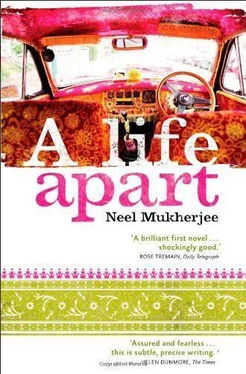She moves over to one of the bookcases; this appears to be the one that houses English books only. Complete works of Shakespeare. The collected poetry and prose of Milton. The works of Dr Johnson. There’s a lot of poetry: Wordsworth, Keats, Shelley, Byron, Browning, Tennyson. Beautiful octavo editions in brown leather with gold-tooled letters on the spine. She picks out one that says, laconically, ‘Lyrics’ only and starts leafing through it. Instantly she recognizes it as the volume of medieval English short poems so beloved of her and Violet, the very book from which they took turns to read aloud to each other on evenings spent in each other’s company only. A random poem catches her eye — ‘Now springes the spray,/All for love I am so seek/That slepen I ne may’ — then another: ‘He cam also stille/Ther his moder was,/As dew in Aprille/That falleth on the grass.’ She is so stabbed with nostalgia, with a kind of homesickness, that she puts the book back and carries on with the safer activity of reading only the titles on spines. Godwin, Mary Wollstonecraft, Thomas More, Locke. She moves to another cupboard. This contains only Bengali books. She has to bend slightly and crane her neck in order to read the writing on the spines. She can only manage to do this slowly in the beginning. Before she has had a chance to decipher some of the letters, as a little test of her fledgling literacy in the language, she notices an edition of Mrs. Beeton. Surely a mistake in shelving otherwise how could it have strayed here, among the Bengali books, she thinks, when she hears footsteps and the swish of fabric outside. Without hurrying, she moves to the sofa, sits and puts down her cup on the glass-covered table in front of her.
As husband and wife enter the room, Miss Gilby stands up. Mr Roy Chowdhury says, ‘No, no, Miss Gilby, please remain seated, there’s no need to stand.’
Bimala stands at his side, head down, the aanchol of her sari lifted up to the back of her head and over it, the rich magnetic blue of the cloth accentuating the deep vermilion parting in the middle. She looks as if she would prefer to be invisible or to hide behind her husband. Dark skinned, slightly built, arms with bangles — gold, coral, the mandatory white shell of the married woman — but nothing ostentatious, the sleeves of her simple blue blouse coming down to her elbows, a plain gold chain around her neck, small gold earrings. She refuses to look anywhere except at the coloured geometric designs on the tiled floor.
Miss Gilby takes in a deep breath — her heart is beating very fast — and says as clearly as she can manage, ‘How do you do Bimala. It is such a pleasure to meet you at last,’ every word separate, enunciated, crystalline.
Bimala keeps her head bowed. Her husband stands at her side and says something in Bengali, which Miss Gilby cannot quite follow. They advance into the room, she so draggingly that it seems she is willing the floor to open up and swallow her, and take their seats on the divan opposite.
Mr Roy Chowdhury addresses Miss Gilby: ‘She’s feeling very shy. She’s been so nervous about this meeting that she has stayed up nearly three nights in a row.’ He laughs affectionately. Bimala whispers something quickly to him. The body language leaves Miss Gilby in no doubt that she is aghast that her husband should reveal this to her English tutor. Which means, Miss Gilby rejoices in her heart, Bimala understands a lot more English than she had been led to believe.
‘What is there to be nervous about? I’m here to be your friend.’ Miss Gilby tries to make her voice as amiable as possible.
There is no verbal response from Bimala but she lifts up her face and looks at Miss Gilby. The large, doe-dark eyes take in the English lady, perhaps the first one she has ever seen at such close range. There is a hint of a smile in the corners of her mouth. She looks down almost immediately again.
Mr Roy Chowdhury and Miss Gilby exchange glances that are at once amused and protective, the sort of look parents and teachers exchange over a child struck dumb by shyness. He says, ‘I think she will speak but it might take time.’
Miss Gilby hastens to allay, ‘Don’t worry, this is just the first meeting. I’m sure she’ll open up with time, won’t you, Bimala?’ She turns her gaze on the young woman who still continues concentrating steadfastly on the patterns on the floor.
Bimala says nothing then she whispers to her husband. Mr Roy Chowdhury nods enthusiastically, says something back, but Bimala seems to react to it with even greater withdrawal.
Mr Roy Chowdhury asks Miss Gilby, ‘Bimala wants to serve you some sweets that she has made herself. She wants me to ask you if you will have some.’
Miss Gilby immediately seizes her opportunity. ‘Yes, of course, I will be delighted. But on one condition.’ She pauses. Bimala looks up expectantly. Good, thinks Miss Gilby, she’s understood every single word.
She speaks slowly and clearly, ‘I will be very happy to eat the sweets you have prepared, Bimala, but only if you ask me directly, not through your husband.’
Mr Roy Chowdhury is pleasantly surprised by this move. He looks at the Englishwoman with admiration.
The silence in the room is expectant. Mr Roy Chowdhury turns to his wife and asks gently, in English, ‘Did you hear that? Aren’t you going to ask her, Bimala?’
Bimala has her hands clasped tightly as if in desperate prayer. She whispers something to her husband and before he can say anything, she gets up and runs out of the room, a flurry of swishing sari and tinkling bangles and anklets.
Mr Roy Chowdhury breaks the surprised silence by chuckling out loud. Miss Gilby joins in too. He says, ‘It’s all a bit new for her. It’s been only a year that she has stepped out of the andarmahal. ’
‘Please don’t apologize, I understand how terrifying it must be for her. Where did she disappear?’
‘I think she’s gone to get you tea. I’ll be surprised if she comes back. She’ll probably send one of the servants.’
She smiles in acknowledgement. They sit talking for a while — he asks her if she is comfortable, if she needs anything, apologizes for any oversight on his part — he’s unfailingly gentle and courteous.
From the sound of footsteps outside, they know that Bimala isn’t the one who is approaching the room; there is no music from her bangles and anklets, but instead the gentle tremor of crockery and cutlery being transported carefully on a tray. A servant appears at the threshold. Mr Roy Chowdhury says something, he enters, puts the huge tea tray down on the table between them and departs.
‘Good, tea’s arrived. Now, Miss Gilby, how do you take your tea?’
There is a great deal of china on the plate, all white, and the teapot is covered in a cosy that has been beautifully embroidered with a motif of songbirds and creepers and roses. Miss Gilby is certain it is Bimala’s handiwork, a special object to be taken out for a special occasion, or maybe even made for this one. The tray is laden with small dishes containing about six varieties of sweets, four of each.
‘Goodness,’ Miss Gilby exclaims, ‘is this all her work? There’s just far too much of it for two. Won’t she be joining us?’
‘I doubt very much. But you must try one of each, at the very least. Otherwise, she’ll think you don’t like her.’ He can’t help smiling when he says this.
Miss Gilby laughs: she is not wound up inside any more. As she watches Mr Roy Chowdhury pour tea, there is once again the sound of footfall outside and, along with it, the jingle of bangles, the rustling of cloth. It stops suddenly. Expecting Bimala, both Mr Roy Chowdhury and Miss Gilby look up. There is a long pause but no one enters. They look at each other and exchange a conspiratorial smile.
Читать дальше












